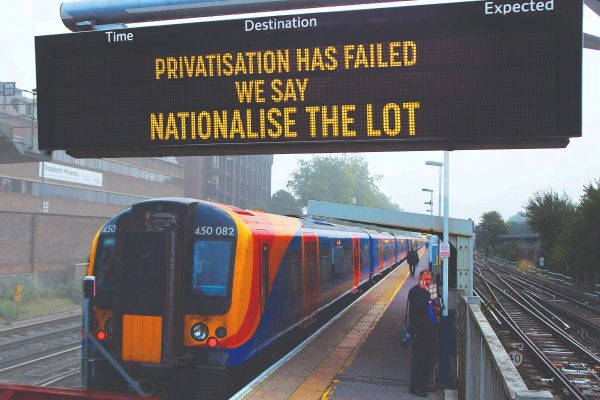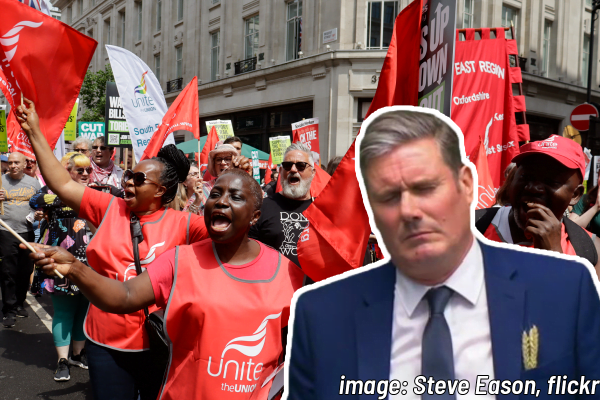As ever, there were many issues up for debate at this year’s gathering of the Trades Union Congress (TUC), Britain’s umbrella body for the trade union movement, which took place in Brighton between 8-11 September.
The context of this week’s event was certainly a little different compared to last year, however.
Crucially, this congress took place under the first Labour government in 14 years. This cast something of a shadow over some of the discussions, leaving unions to navigate a political minefield set by Starmer’s party.
Debates
Many unions clearly see a chance now to push their priorities, after years of butting heads with successive Tory governments.
In one debate, delegates called for the nationalisation of railways, transport, and buses, arguing that it’s high time to “prioritise public need over private profit”.

Elsewhere, grave concerns were raised about workplace safety in schools and hospitals, with speakers demanding urgent action to address budget cuts and crumbling infrastructure.
Those on the rostrum also took a firm stance against fascism and racism, declaring that workplaces must be bastions in the fight against the far right and bigotry.
Unions across the board – from the FBU to Unite; from USDAW to PCS – also rallied to demand the repeal of all anti-union laws, particularly denouncing the disgusting Minimum Service Levels Act.
Divides
Divisions also opened up on some key questions, however. Unite, Unison, and the NEU, for example, clashed over the question of green jobs and the idea of a “just transition”.
The debate on Britain’s relationship with Europe saw differences, too. Some unions advocated for closer ties between the UK and the EU, in order to protect employment rights and trade. Others, like the RMT, opposed this, arguing that regulations from Brussels could thwart plans for nationalisation of the railways.
There are clearly cracks in the union movement. Instead of cooperating and collaborating in the collective interest of their members, for example, ‘sister’ unions will often treat each other as competitors.
This has already been seen in recent times with the fight between Unison and the NEU, as to who has the ‘right’ to organise support staff.
This, ultimately, is the product of the reformist outlook of the union leaders. This has us fighting each other for scraps off the capitalists’ table, rather than uniting to demand the whole feast.
The seeming contradiction between sustainable production and secure jobs, for example, only exists because of the artificial scarcity created by the capitalist market.
A socialist programme would offer a way forward, via a rational and democratic plan of production. But there was no mention of such a solution from anyone at the TUC congress.
Austerity
Throughout congress, speakers consistently expressed an urgent need for Labour to follow through on its ‘commitments’, with demands for “iron-clad guarantees” from the party’s leaders, and calls for Starmer and Reeves to “fulfil their promises”, “side with workers”, and “not let us down”.
Amidst all this talk, however, only PCS proposed concrete action. Most notably, the union suggested that there should be an emergency conference called in the event that the Labour government does not pass its full ‘New Deal’ programme on workers’ rights within 100 days of being in office.
The dangers of taking Labour at its word were only sharpened on the second day, during Starmer’s speech to congress.
With honeyed words, Starmer promised his audience a pro-business and pro-worker approach – a case of suggesting that Labour and the unions could have their cake and eat it too.
But what came next was key. Starmer was careful to emphasise that he would need to make “hard and unpopular decisions on some issues”, as part of his self-described efforts to get the economy back on track.
In other words, he and his Chancellor will carry out austerity – a promise made directly from the TUC podium!
Leadership
The idea that Labour will “fulfil its promises” – at the same time as Starmer is promising us cuts to our faces – is a sick joke.
Justifying his attacks on workers, Starmer mentioned multiple times the “black hole” in the government’s budget left by Tories. What he neglected to mention is the billions of pounds accumulated by the rich in this same period.

The idea of an emergency TUC congress to deal with any Labour backsliding is a start. But it must be carried out with definitive aims.
What is needed is a commitment to coordinate strike action against Starmer’s cuts, with a definite pledge for the whole movement to defend every and any sector that is attacked.
For too long, union leaders have been happy to accept promises from the Starmers of their day at face value. For them, it’s a case of fine words in public, alongside ‘pragmatic’ negotiations behind closed doors.
But these leaders belong to the past, not the present.
What is needed is a fighting strategy to force genuine gains from Labour. And that requires a real militant leadership too. The urgency of building this has never been greater.






